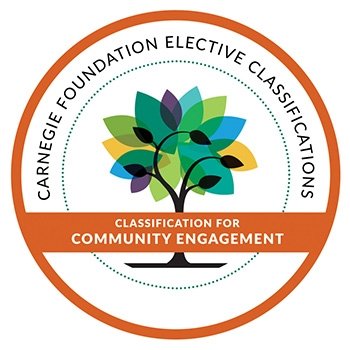Pitzer Receives Carnegie Classification for Community Engagement
For its eighteenth consecutive year, the Carnegie Foundation for the Advancement of Teaching recognized Pitzer College's national leadership in community engagement work.
Pitzer College is the recipient of a 2024 Carnegie Elective Classification for Community Engagement, which acknowledges a deep commitment to community engagement and effective collaboration with community partners in substantial and impactful ways.

“We recognize these institutions for their exceptional commitment to community engagement and their work to transform knowledge into meaningful action,” said Timothy Knowles, president of the Carnegie Foundation for the Advancement of Teaching, in a statement released by the foundation to announce this year's recipients.
Pitzer is among 368 institutions across the country holding this designation and has held this special classification since 2006, when the program was first established to recognize the public service of higher education institutions. Classifications are awarded following a process of extensive self-study by each institution, which is then assessed by a national review committee.
“It is an honor to have Pitzer’s efforts in serving the public honored with this prestigious designation again this year,” said Tricia Morgan ’08, who directs Pitzer's Community Engagement Center (CEC) and served as the lead on the Carnegie application. “This work is made possible by the dedicated faculty, students, and community partners of Pitzer College.”
The Carnegie Foundation for the Advancement of Teaching and the American Council on Education oversees the entire selection process.
“This work is made possible by the dedicated faculty, students, and community partners of Pitzer College.”
–Tricia Morgan ’08
Community engagement is woven across the academic experience at Pitzer. Though the College does not “have an institutionally sanctioned definition of community engagement,” noted Morgan in the application, Pitzer does espouse “a largely decentralized approach to community engagement, embedding these practices across multiple curricular and co-curricular areas of the institution.”
That decentralized approach includes — but isn’t limited to — the work being done by the CEC, Critical Action Social Advocacy Pitzer, the Justice Education Initiative, and the Robert Redford Conservancy for Southern California Sustainability. Morgan noted many other campus groups and programs actively involved in outreach to community partners.
The College’s notification of its selection was accompanied by a note from the Carnegie team expressing hope that the College “will find ways to support campuses that are in earlier stages of institutionalizing community engagement. Your guidance will contribute significantly to the strength of community engagement across higher education.”
For Morgan, that message “is a lovely acknowledgement that Pitzer is truly a leader in the field.”